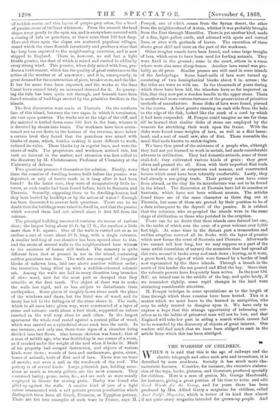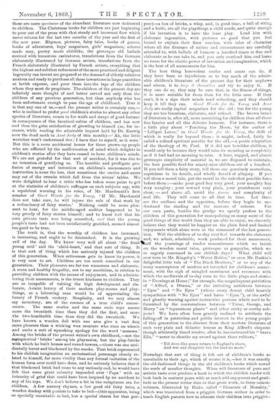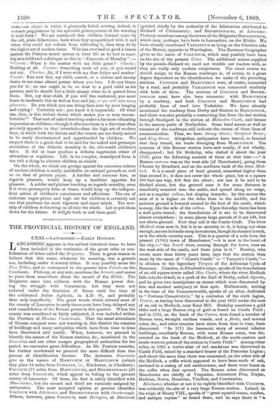THE WORSHIP OF CHILDREN.
WHEN it is said that this is the age of railways and the electric telegraph and other such arts and inventions, it is described by mere accidents. Socially it has much more cha- racteristic features. Consider, for instance, the excessive elabora- tion of the toys, books, pictures, and literature, produced specially for children. Here is a man of genius, Mr. George Macdonald, for instance, giving a great portion of his time to write and edit Good Words for the Young, and for years there has been produced by Mrs. Alfred Getty a magazine for children, called Aunt Judy's Magazine, which is better of its kind than almost if not quite every magazine intended for grown-up people. And these are mere specimens of the abundant literature now dedicated to children. The Christmas books for children are just beginning to pour out of the press with that steady and incessant flow which never relaxes for the last two months of the year and the first of the new year. Rhymes, pictures, fairy tales, books of games, books of adventures, boys' magazines, girls' magazines,' science made easy, poetry made childlike, the grotesque old ballads revived with humorous caricatures, translations from the German elaborately illustrated by German artists, translations from the French elaborately illustrated by French artists, everything that the highest and subtlest refinementof the most practised and diligent ingenuity can invent are prepared at the demand of elderly relatives anxious and ready to purchase all these inventions in large quantities at lavish expense, and pour them into the laps of the children whom they most do propitiate. The children of the present day are infinitely more thought of and better served not only than the children of any previous generation, but than anybody who has been unfortunate enough to pass the age of childhood. True it Is that any one of us,—and the present writer is certainly one,— who is inclined to prefer good children's stories to almost any other species of literature, comes in for waifs and strays of good fortune in consequence of this fanatical cultus of children, and has now and then the grim satisfaction of growling to himself (as, for in- stance, while reading the admirable inquest held by Dr. Earwig over the dead moth in Aunt Judy of this month)—' Ah, the little wretches won't understand that ; I have that to myself, as it were.' But this is a mere accidental bonus for those grown-up people who are afflicted by the malformation of mind which delights in children's stories after they have ceased to have children's minds. We are not grateful for that sort of accident, for it was due to no intention of gratifying us. The horrible and profligate pro- fusion of energy and invention on children's amusements and instruction is none the less, that sometimes the uncles and aunts may eat of the crumbs which fall from the nieces' tables. We were delighted to hear a critic who has taken some pains to get at the statistics of children's suffrages on such subjects say, with a sepulchral warning in his voice, of Mr. Macdonald's first number of Good Words for the Young, 'If Mr. Macdonald does not take care, he will injure the sale of that work by a redundancy of fairy stories.' Nothing could be more plea- sant to hear, for the middle-aged auditor happened to be very greedy of fairy stories himself ; and to know both that his own private taste was being consulted, and that the young people's taste had not been satisfactorily gratified, seemed almost too good to be true.
The truth is, that the worship of children has increased, is increasing, and ought to be diminished. It is the growing evil of the day. We know very well all about the fresh young soul' and the 'child-heart,' and that sort of thing. It is that sort of thing which has seriously injured the children of this generation. When artlessness gets to know its power, it is very near to art. Children are too much consulted in our generation. Their pleasures are far too numerous and elaborate. A stern and healthy frugality, not to say asceticism, in relation to providing children with the means of enjoyment, and in adminis- tering their amusements, is the truest kindness to children. They are as incapable of valuing the high development and ela- borate, Asiatic luxury of their modern play-rooms and play- things, as a labouring man would be of appreciating the luxury of French cookery. Simplicity, and we may almost say monotony, are of the essence of a true child's amuse- ments. The same stories and the same rude toys amuse more the twentieth time than they did the first, and more the two-hundredth time than they did the tweutieth. We _have known a wooden doll with one arm give a vast deal more pleasure than a winking wax creature who runs on wheels and emits a sort of squeaking apology for the word mamma.' Among the bricks of the present writer's own childhood,—not the mietaphorical ' bricks ' among his playmates, but the play-bricks with which he built houses and round-towers,—there was one acci- dentally burnt and blackened by the smoke. That brick represented to his childish imagination an ecclesiastical personage closely re- lated to himself, far more vividly than any formal imitation of the lumen form ever could have done, and he seriously believes that if that blackened brick had come to any untimely end, he would have felt that some great calamity impended over 'Papa' with an intensity of grief that could have been inspired by no accident to any of his toys. We don't believe a bit in the voluptuous era for children. A few nursery rhymes, a few good old fairy tales, a wooden donkey with paniers to take to bed—(this apparatus, being so specially unsuitable to bed, has a special charm for that pur-
pose)—a box of bricks, a whip, and, in good time, a ball of string and a knife, are all the playthings a child needs, and quite enough if his invention is to have the least play. Load him with elaborate ingenuities, with pictures so good that you feel bound to explain their finer touches, with tales of character where all the fitneases of nature and circumstance are carefully attended to, with ballads of humour a hundred times as fine and elaborate as he can take in, and you only overload him and leave no room for the elastic power of invention and imagination, which is the best of all amusements for him.
The best thing benevolent uncles and aunts can do, if they have been so injudicious as to buy much of the admir- able children's literature of the present day for their nephews
and nieces, is to keep it themselves and try to enjoy it. If they can do so, they may be sure that, in the fitness of things, it is more suitable for them than for the little ones. If they can't, it is a sign their minds need refreshing, and they should keep it till they can. Good Mord* for the Young and Aunt Judy are really capital magazines for the old ; but for the young they are too luxurious, elaborate, and refined. The brown bread of literature is, after all, more nourishing for children than all these fine fancies and all this delicate humour. For instance, there is a little play about "Touching the Moon, by the author of " Lilliput Levee," in Good Words for the Yining, the drift of which is really far beyond them ; it might, indeed, fairly be called a refined spiritual parable for the old,—a poetic adaptation of the theology of St. Paul. If it did not bewilder children, it would only be because they would miss its meaning as completely as if it had had no meaning to miss. A bare, rugged, and almost grotesque simplicity of material is, we are disposed to maintain, the beat possible food for ninety-nine children out of a hundred. If you tell them a fairy story, tell them one genuinely marvellous, capricious in its details, and wholly devoid of allegory. If you tell them a moral tale, put the moral in the nakedest possible form before them ;—make your good boy very good, your naughty boy very naughty ; your reward very plain, your punishment very clear, — and above all, avoid the finesse and complexity of real life. They will come to all that in time. Let them see the outlines and the opposites, before they begin to un- derstand the shading and the mixture of colours. For our own parts, besides the grudge we openly profess to the children of this generation for monopolizing so many more of the good things of this world than they are able to enjoy, we sincerely believe that they would be happier on the plain food and limited enjoyments which alone were at the command of the last genera- tion. Will the children of to-day ever feel towards the elaborate and, we admit, admirable, work produced for their amusement, alf the yearnings of tender remembrance which we lavish on the wooden moral tales, grotesque as gargoyles, which we so eagerly consumed in our childish days? What child will ever turn to Mr. Kingsley's "Water Babies," or even Mr. Ruskin's delightful little tale of "The Black Brothers," or to any of the many masterpieces of modern art intended for children's amuse- ment, with the sigh of mingled merriment and reverence with which the inedimvals of to-day turn to the little playa and stories in "Evenings at Home ;" for example, the magniloquent patriotism of "Alfred, a Drama," or the irritating antithesis between " Eyes " and "No Eyes " (where every decent child heartily sympathizes with "No Eyes" and hates "Eyes "), or the awful and ghastly warning against instructive persons which used to be furnished by the conversations between "Tutor, George, and Harry" on "leguminous plants" and other sticky or earthy sub- jects? We have often been gravely inclined to attribute the falling-off in patriotism and public interest in the young people of this generation to the absence from their modern literature of such very plain and didactic lessons as King Alfred's eloquent though arbitrarily timed resolve, after he has embraced his "brave Ella," "never to sheathe my sword against these robbers," "Till dove-like peace return to England's shore, And war and slaughter vex the land no more."
Nowadays that sort of thing is left out of children's books as unsuitable to their age, which of course it is, —but it was exactly the old-fashioned things in the old children's books which sowed the seeds of manlier thoughts. When will literature of pure and artistic taste ever produce a book to which the childish reader will look back in maturer years with as much odd enjoyment and grati- tude as the present writer does to that great work, in three minute volumes, illustrated by Blake, called "Elements of Morality," which was translated from a priggish German author in order to teach English parents how to educate their children into priggish-
ness,—an object in which it gloriously failed, serving, indeed, to unteach priggishness by the splendid grotesqueness of the warning it held forth ? We are convinced that children learned more by the old, plain didacticism, both when they sympathized with it and when they could not refrain from ridiculing it, than they do by the higher art of modern times. Who has ever had so good a lesson against the Paleyan moral system in later life as he had in read- ing as a child such a dialogue as this in "Elements of Morality" :— " Curate : What is the matter with my little guest ? Charles: Nothing at all. Curate: Something must ail you, or you would not cry. Charles: Ali, if I were with my dear father and mother ! Curate: You now feel, my child, sorrow, or a violent and uneasy desire to see some absent person whom you love. I do not blame you for it ; no one ought to be so dear to a good child as his parents, and he should feel a little uneasy when he is parted from them. But, my dear child, if you will live contented, you must learn to moderate this as well as fear and joy, or you will miss many pleasures. Do you think you can bring them here by your longing and crying? Certainly not ; you know it is impossible. Of what use, then, is this violent desire which makes you so very uncom- fortable?" That sort of naked teaching makes a far more educating impression on children—though it educates them in a direction often precisely opposite to that intended—than the high art of modern days, in which both the bitters and the sweets are too finely mixed to be easily discriminated and apprehended by children. We suspect there is a great deal to be said for the naked and grotesque absolutism of the didactic morality in the old-world children's tales. It did at least produce a definite impression either of attraction or repulsion. Life in its complex, unanalyzed form is too rich a thing to educate children as clearly.
On the whole, we think our grudge against the excessive culture of modern children is really justifiable on rational grounds as well as on that of private pique. A hardier and au.sterer fare, as regards pleasure, would keep up a healthier appetite for pleasure. A solider and plainer teaching as regards morality, even if it were grotesquely false at times, would keep up the indepen- dent action of children's consciences and affections. The era of elaborate sugar-plums and high art for children is certainly not one that produces the most vigorous and eager minds. The wor- ship of children is throwing us all into the shade. Let us put them down for the future. It will;do both us and them good.
































 Previous page
Previous page